General Review
Since its establishment in 1984, the ECPD has been involved in the following activities:
- Postgraduate studies
- Research projects and studies
- Scientific and other international meetings and conferences
- Publication of books, studies, proceedings etc.
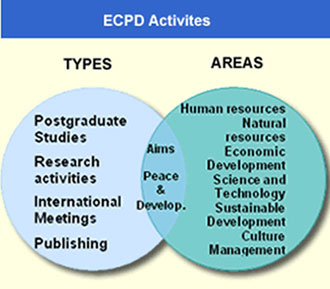
Within the scope of its activities, ECPD has launched and implemented numerous projects, such as: the programs of postgraduate studies, research projects, international scientific and consultative meetings, specialist courses and seminars, published proceedings journals and other publications. Some of the ECPD events were attended by several hundreds of participants, ranging from scientists to ohigh level fficials and public figures from almost all parts of the world.
In the future, the European Center for Peace and Development plans to implement its programs of postgraduate studies primarily at university centres in the new states, former Yugoslav republics, in some other countries of the South East Europe and some other European countries.
Organizational structure, requesting new associates and heading staff, establishing cooperative environment has been also greatly achieved.
Being situated in the very center of an unstable and underdeveloped area, the European Center for Peace and Development makes special efforts in launching and carrying out research projects designed to contribute to the improvement of peace and development of the Balkan countries.
The international scientific and other meetings, organized by the ECPD, have proved to be a very useful way of bringing together prominent scientists, experts and public figures from various parts of the world to exchange their views and experiences and to improve their knowledge. Remarkable results accomplished by the ECPD in this field are the best reference and guarantee for its further success in this field of activity.
The advanced training and education conducted through specialist schools, courses and/or seminars at the local and/or regional and international levels are another well-marked way leading to the improvement and transfer of knowledge. Based upon its rich experiences, the ECPD continues to organize and carry out these activities intended to improve the performance of managers, researchers and other participants in their professional skills.
The tasks, program and strategy of the European Center for Peace and Development arise from the Charter of the United Nations, Charter of the University for Peace, the provisions of the International Agreement on the ECPD Headquarters and its Statute, as well as the resources available to the ECPD. In this regard:
The European Center for Peace and Development defined its basic task: to bring together the intellectual potentials of the East and the West, and the North and the South in the implementation of projects devoted to the promotion of peace, development and international cooperation. In carrying out this task, the ECPD covers the territory of Europe, but it is also open to proposals for cooperation with other parts of the world, as has been demonstrated by the recruitment - apart from numerous experts in different areas from Europe, of leading ECPD experts the USA, Canada, Japan, China, India and other countries, as well as the participation of world - reputed experts from almost all continents in numerous scientific meetings organized by the ECPD;
The ECPD has transformed its basic tasks into the ECPD Program, which has been implemented by laying emphasis on:
Organizing studies leading to the postgraduate degrees and postgraduate specialist training in several scientific disciplines and fields;
Initiating and conducting research on specified problems of peace, development and international cooperation;
Organizing and conducting international scientific and consultative meetings (conferences, seminars, courses, round tables, academic and expert workshops and the like); and
Publishing professional and scientific texts, proceedings of scientific meetings, textbooks for postgraduate studies, etc.
With such an orientation, the ECPD has so far been engaged in almost all fields of science and research, including: the rational use of energy, development and conservation of natural resources, development of human resources and economic development, technical and technological progress, cultural and democratic development and the like. Notable activities, which produced remarkable results, included environmental protection, modern and traditional medicine, aimed at preserving human resources for the development of new technologies (advanced robotics and intelligent automation of the neuron network), banking, finance and international trade, promotion of small and medium-sized enterprises, management of economic and non-economic activities and the like. Hence the ECPD strategy has been to focus attention on a synergetic multidisciplinary and holistic approach to studies, aimed specifically at the timely recognition and efficient solution of the problems of development and the quality of life in specified regions in Europe, especially in its south - eastern part.
After the changes that took place in Europe during the late 1980s and early 1990s, the ECPD shifted its attention towards the ex - socialist European countries, i.e. countries in transition. In selecting the main directions of its activities and their performance, the European Center for Peace and Development proceeded from the facts that:
A widening gap between the developed and underdeveloped countries and regions is continuously causing inequalities, imbalances and conflicts, which may become the sources of internal and international tensions, thus endangering peace and development;
Development cannot only be defined in terms of the growth of per capita income, which is undoubtedly a vital prerequisite for progress, but also as a genuine improvement of the quality of life in all of its aspects, and as the ultimate objective of any strategy aiming at genuine development and stable peace; and
The countries of Eastern, Central, South - Eastern Europe and the Commonwealth of Independent States, which are undergoing the process of economic transition and social and political transformation, feel a specific need for new approaches and knowledge, which the European Center for Peace and Development can satisfy to a significant extent thanks to its experience and achievements.
The ECPD strategic orientation towards a synergetic and multidisciplinary approach to studies was also influenced by the fact that it would not be realistic to expect that the ECPD could pursue comprehensive research in all mentioned fields of science and cover such a wide scope of activity. This would not be realistic and is unnecessary, since a great number of international, regional and national institutions have been intensively and to some extent successfully dealing with the same issues for decades. What the European Center for Peace and Development wishes to be identified with is a synergetic and multidisciplinary approach to postgraduate training and research projects – through which it will contribute to peace, development and international cooperation.
Promotion of peace, reconciliation, socio-economic development and international cooperation through capacity building that is achieved by organizing and offering postgraduate studies, applied research, consulting and dissemination of knowledge.
"The Center's basic aim is determined by its name and mission: to preserve human potentials, to bring together intellectual potentials of the West and East and to promote cooperation between the North and South. To this end, the Center will lay emphasis on an interdisciplinary, holistic approach and creative atmosphere of a real teamwork, not only in its researches, but also in its postgraduate courses. So far, we have secured associates from Madrid and Moscow, Paris and Brussels, Milan and Dublin, Budapest and London." (Prof. Dr Simonida Marjanović, at the session of the Council of the University for Peace in New York, June 1988)"

The University for Peace (UPEACE), San Jose, Costa Rica, was established by the United Nations General Assembly pursuant to its Resolution 35/55 of December 1980 to "provide humanity with an international institution of higher education for peace and with the aim of promoting among all human beings the spirit of understanding, tolerance and peaceful coexistence, to stimulate cooperation among people and to help lessen the threats to world peace and progress..."
The UPEACE performs its noble task under the slogan "SI VIS PACEM – PARA PACEM" (If you desire peace – prepare for peace).
"Powerful nations must understand that if sophisticated weapons cannot control the unorthodox surprise action of guerillas, nor stop the cowardly activities of terrorists not, much less, win wars, we have come to the moment in which peace must dominate in the mind of man: a result only possible through education." (Rodrigo Carazo, Dialogue, July 1987)

Signing of Agreement
Where did the ECPD get its name from?
The word "European" forms part of our name, because the Center was established under an international agreement to operate in the territory of "Helsinki Europe" which, as is known, includes the countries of Europe and North America".
The words "for Peace" implies that the Center operates with the World University for Peace established by the organisation of United Nations; and
The words "and Development" stem from the awareness that a lasting peace cannot be ensured unless the countries and nations, to which destiny was a stepmother, start to develop in a considerably faster and more harmonious way than hitherto, as well as from universal truth that there is no peace without development.
Simonida Marjanović
The University for Peace, San José, Costa Rica, was established by the United Nations General Assembly pursuant to its Resolution 35/55 of December 5, 1980. The adoption of this Resolution was preceded by the following major steps:
· The adoption of the UN General Assembly Resolution 33/109 on December 18, 1978, by which the idea of establishing the University for Peace was presented, as proposed by the President of Costa Rica, Rodrigo Carazo;
· The adoption of UN General Assembly Resolution 34/111 on December 12, 1979, by which Rodrigo Carazo was given credit for his initiative and it was approved to establish such “an institution of higher education which would work on the achievement of one of the basic aims of the founders of the United Nations: the maintenance and promotion of peace”. This Resolution also provided for the formation of International Commission, which would consist of about 20 experts from all continents and whose task would be to prepare the program and propose the organizational structure of the University for Peace;
· The submission of the Report to the UN General Assembly in December 1980 by the Chairman of the International Commission, Rafael Caldera, President of the Republic of Venezuela, including the appropriate proposals and the draft of the International Agreement on the Establishment of the University for Peace, with its seat in Costa Rica;
· The signing of the International Agreement and, finally, the adoption of Resolution 33/55, by which the establishment of the University for Peace was approved in order “to provide humanity with an international institution of higher education for peace and with the aim of promoting the spirit of understanding, tolerance and peaceful coexistence among all human beings, to stimulate cooperation among peoples and to help lessen obstacles and threats to world peace and progress, in keeping with the noble aspirations proclaimed in the Charter of the United Nations”, whereby it would carry out its activities within the United Nations University system.
The most important document of the University for Peace is its Charter which prescribes the aims and purposes, legal status, organization and functioning of the Council of the University for Peace, as well as other relevant issues. The Annex to the Charter presents the general principles of the University’s “struggle for peace”, primarily through “education for peace” (Resolution 33/55 and the UPEACE Charter).
ECPD Headquarters Building
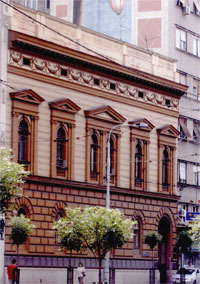
The Decision on the composition of the Council, as the governing body of the University, was made by the UN Secretary General and it was published in the Bulletin of the UN Information Office in September 1981. At the inaugural session of the Council, Rodrigo Carazo Odio, President of Costa Rica, appointed Professor Simonida Marjanović to be President and, Vice - President of the Executive Council of UNESCO. By constituting the Council, the responsibility for the work of the University for Peace was transferred to the Council, and the responsibility of the Council to the UN Economic and Social Council.
Within the framework of the above mentioned Charter, the Council of the University for Peace is authorized, inter alia, to establish such organs and offices as are required for the fulfillment of the purposes of the University for Peace. In accordance with these provisions (Article 4 and Article 7(h) of the Charter), the European Center for Peace and Development was established as an autonomous educational and research European regional organization.
The Establishment of the ECPD
Bearing in mind the significance of the European region and in accordance with the provisions of the Charter of the University for Peace, the Council of the United Nations University for Peace decided, by its Resolution UPEACE - C2/19 of January 20, 1983, to accept the proposal of the Vice - President of the Council, Professor Simonida Marjanović, to establish, in agreement with the Government of Yugoslavia, the European Center for Peace and Development headquartered in Belgrade.
The publishing of Resolution UPEACE - C2/19 of the Council of the University for Peace in the official UN Bulletin attracted the attention of a number of European countries. Interest in hosting the ECPD was shown by those countries in which some of the specialized agencies within the United Nations system were already operating, or whose capitals had already been the venue of conferences on peace and security in the world. However, after considering the relevant factors, as well as the authority of the institution which had submitted the proposal, the Council of the University for Peace decided that the headquarters of the ECPD should be in Belgrade. The ECPD is an international, regional and extraterritorial organization. It enjoys the academic freedom needed to fulfill its mandatory tasks and objectives.
The Yugoslav Government responded positively to the initiative of the Council of the University for Peace. On October 22, 1984, the Yugoslav Government and the University for Peace concluded an International Agreement on the Establishment of the European Center for Peace and Development, with headquarters in Belgrade. Among other things, this Agreement defined the Status of the ECPD (as an extraterritorial, autonomous, educational and research regional institution with headquarters in Belgrade) as well as the financial and other conditions for its future operations.
The International Agreement underwent the appropriate parliamentary procedure, including its ratification, which was signified by the Law on the Ratification of the Agreement of 22 October, 1984, and the Decree on the Promulgation of the Law on the Ratification of the Agreement of July 17, 1985.
These three documents were published in “Službeni list SFRJ – Međunarodni ugovori” (“Official Gazette of the SFRY – International Treaties”) No. 9/85, July 26, 1985. By this act, the European Center for Peace and Development, with headquarters in Belgrade, came into existence and that was also the date on which the ECPD began its activities aimed at promoting peace, development and international cooperation.
After the events which led to the dissolution of the former Yugoslavia (SFRY), the Government of the Federal Republic of Yugoslavia (FRY) assumed the obligations of the SFRY, arising from the mentioned International Agreement on the Headquarters of the European Center for Peace and Development, in keeping with the continuity of Yugoslavia as a state.
In addition to respecting the above mentioned extraterritorial status, which implies specified privileges and immunities, the Federal Republic of Yugoslavia (FRY) assumed the obligation, later on the Republic of Serbia, as its successor, to provide (adequate premises for its administrative headquarters in Belgrade) for the use of the European Center for Peace and Development. The ECPD carries out its tasks and objectives from Belgrade, Terazije 41 and Kablarska 29. The ECPD may carry out its activities in other premises in the territory of the Republic of Serbia and territory of all countries which emerged from former Yugoslavia. The Governments of the interested European countries make - at their own discretion - contributions to some projects and activities of the ECPD from their budgets.
As regards material and financial support for its activities, the ECPD is an autonomous organization which covers the costs of its activities from contributions made by international and national organizations, interested in concrete research programs, international scientific and expert meetings, as well as from tuition and registration fees paid by participants in the ECPD postgraduate studies at the specialist, master’s and doctoral levels, as well as in other courses and seminars.
The European Center for Peace and Development enjoys academic freedom required for the achievement of its aims, especially with respect to the selection of topics and methods of research, academic personnel and other staff, as well as educational programs and forms of disseminating knowledge with a view to promoting peace, development and international cooperation.
Related document:
Establishment and Tasks of the University for Peace
2018
****************************
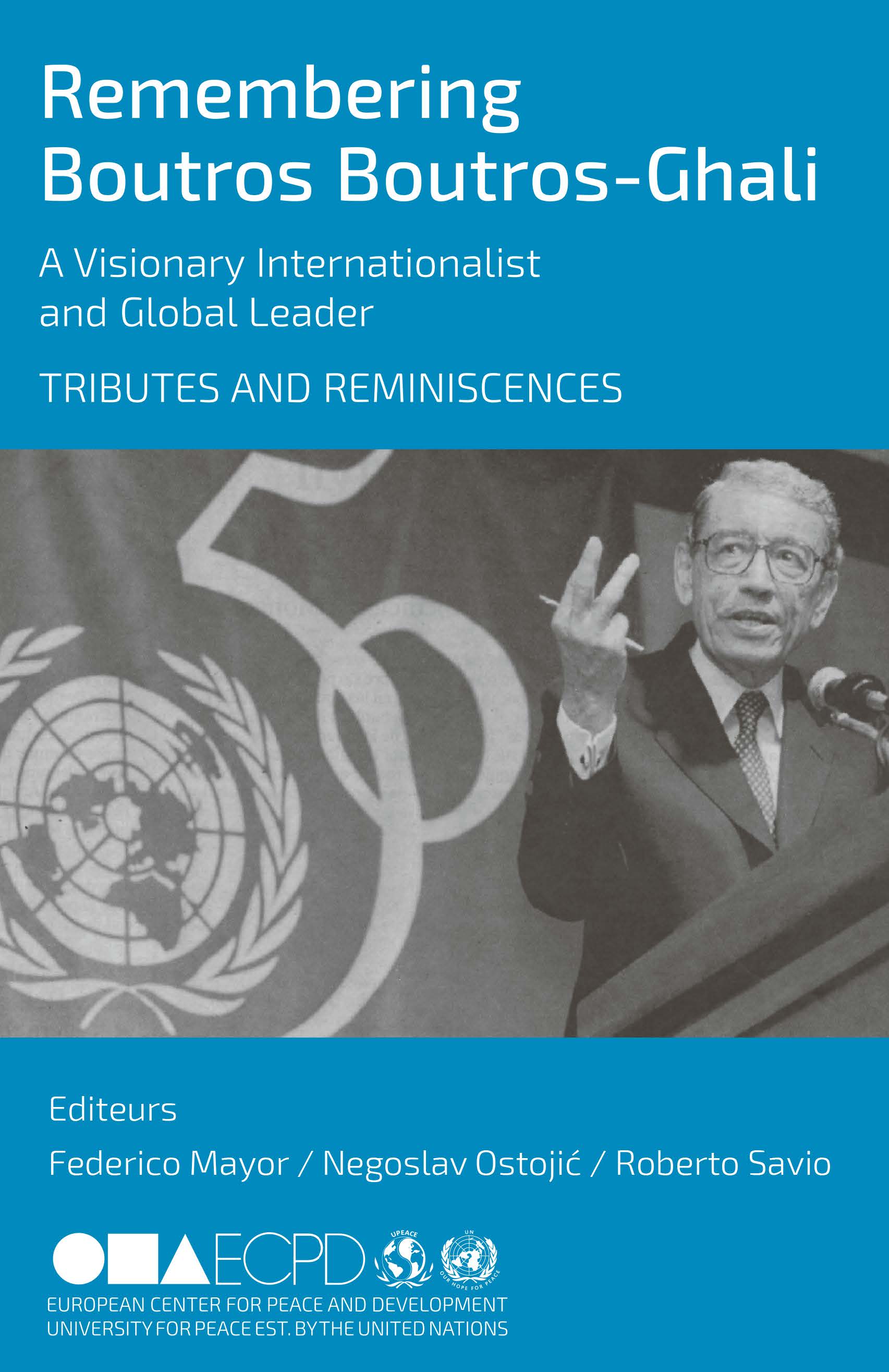
Remembering Boutros Boutros-Ghali
A Visionary Internationalist and Global Leader
Federico Mayor/Negoslav Ostojić/Roberto Savio
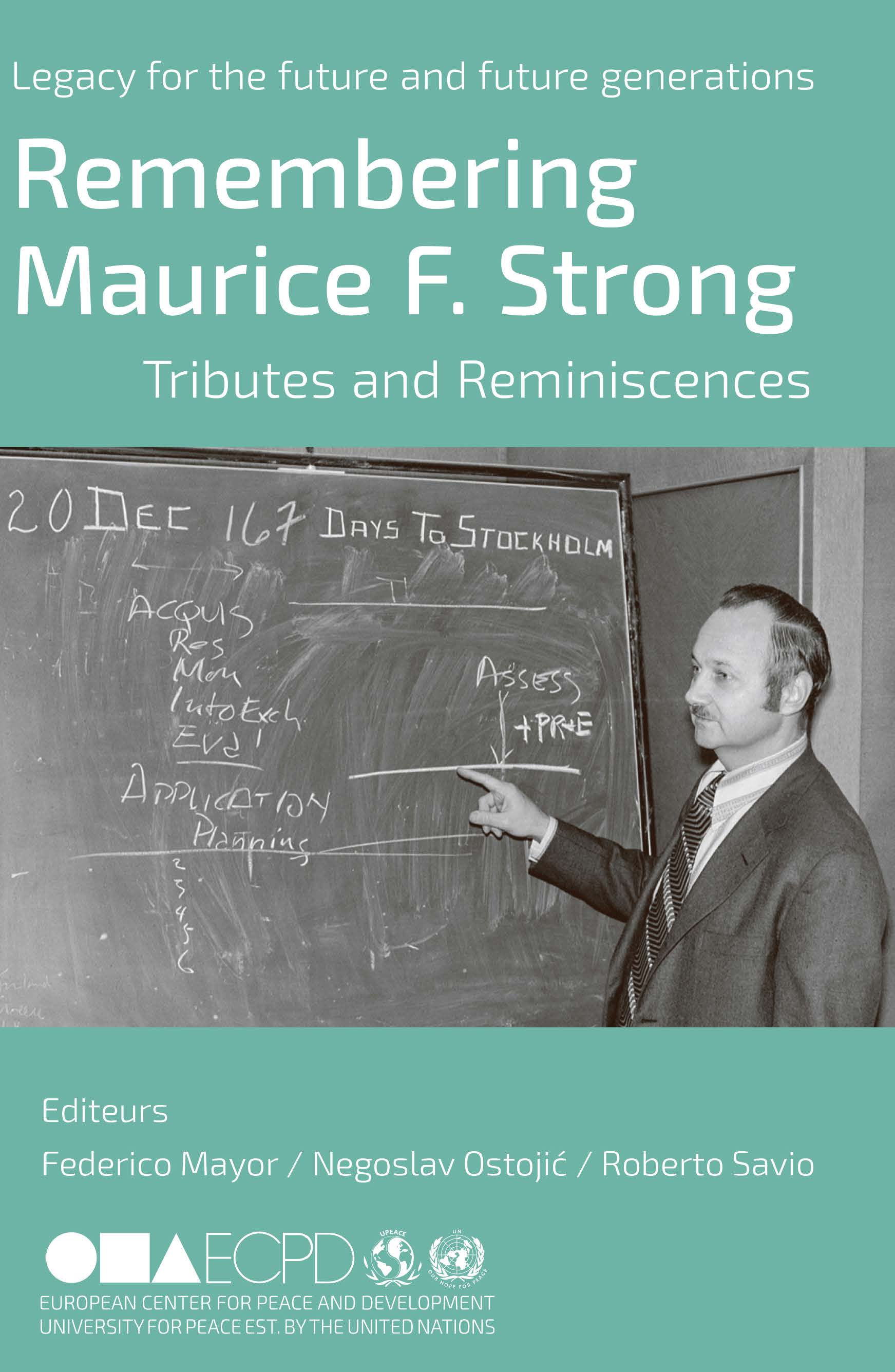
Remembering Maurice F. Strong
Tributes and Reminiscences
Federico Mayor/Negoslav Ostojić/Roberto Savio
2016
****************************

Remembering Grant: Champion for Children
Presentation of the book
Jim Grant
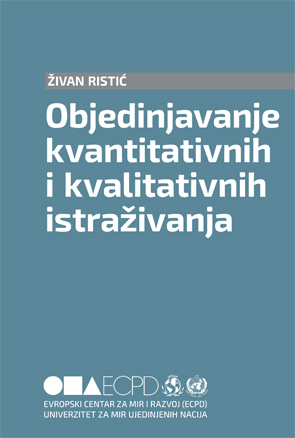
Objedinjavanje kvantitativnih i kvalitativnih istraživanja
Živan Ristić
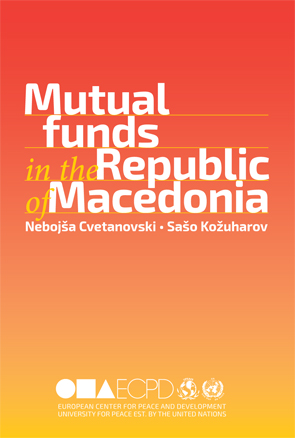
MUTUAL FUNDS IN THE REPUBLIC OF MACEDONIA
Nebojša Cvetanovski, Sašo Kožuharov
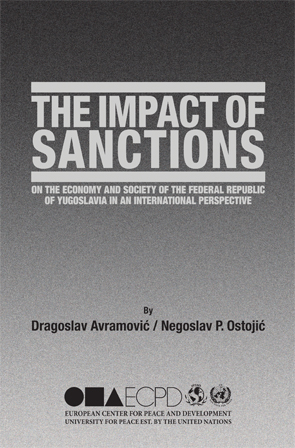
THE IMPACT OF SANCTIONS
on the Economy and Society of the Federal Republic of Yugoslavia in an International Perspective
Dragoslav Avramović / Negoslav P. Ostojić
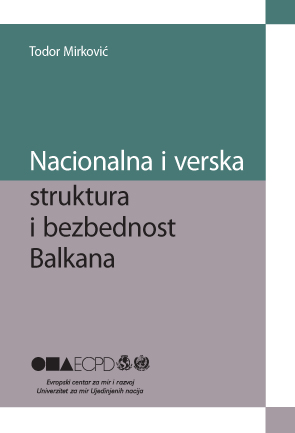
NACIONALNA I VERSKA STRUKTURA I BEZBEDNOST BALKANA
Todor Mirković
2015
****************************
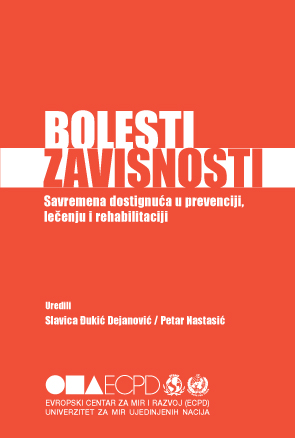
BOLESTI ZAVISNOSTI
Savremena dostignuća u prevenciji, lečenju i rehabilitaciji
Slavica Đukić Dejanović / Petar Nastasić
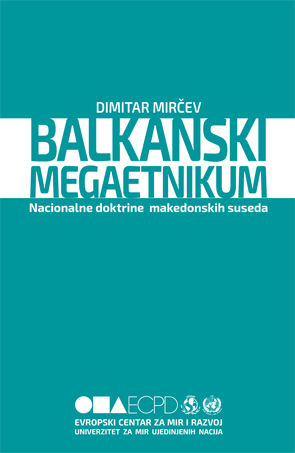
BALKANSKI MEGAETNIKUM
Nacionalne doktrine makedonskih suseda
Dimitar Mirčev
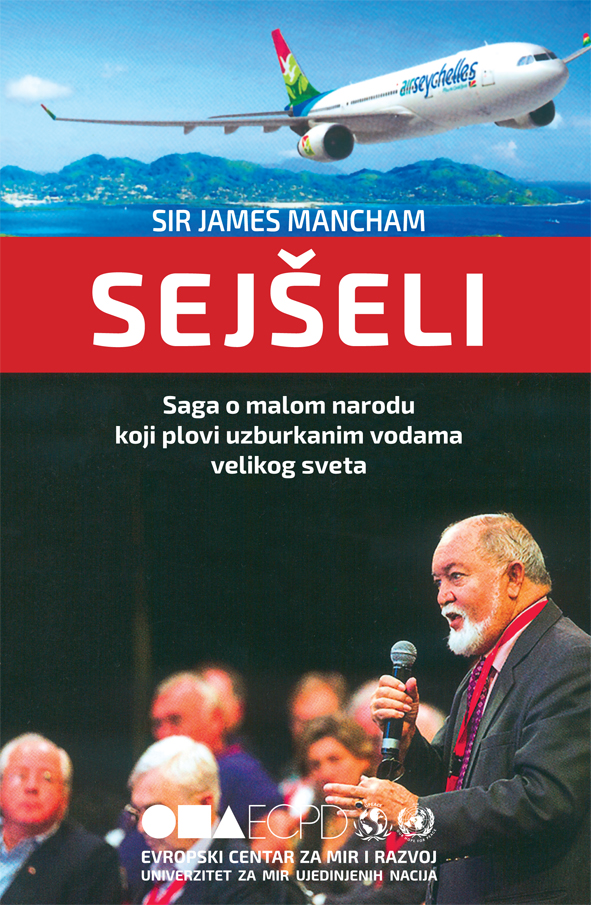
Džejms R. Menčam
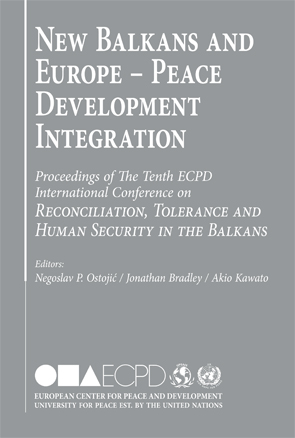
New Balkans and Europe – Peace Development Integration Reconciliation, Tolerance and Human Security in the Balkans
Proceedings of the Tenth ECPD International Conference
Negoslav P. Ostojić / Jonathan Bradley / Akio Kawato
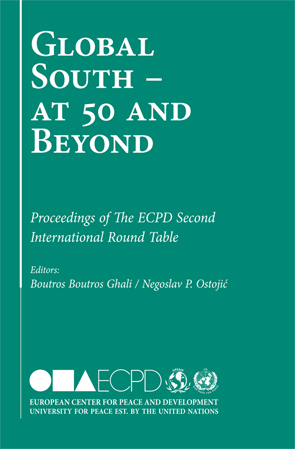
Global South – at 50 and Beyond
Proceedings of The Second ECPD International Round Table
Boutros Boutros Ghali / Negoslav P. Ostojić
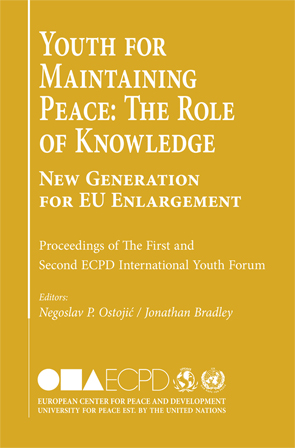
Youth for Maintaining Peace: The Role of Knowledge New Generation for EU Enlargement
Proceedings of the First and Second ECPD International Youth Forum
Belgrade, October 2013 and October 2014
Negoslav P. Ostojić / Jonathan Bradley
2014
****************************
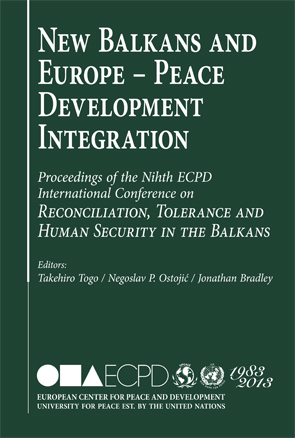
New Balkans and Europe – Peace Development Integration Reconciliation, Tolerance and Human Security in the Balkans
Proceedings of the Ninth ECPD International Conference
Takehiro Togo / Negoslav P. Ostojić / Jonathan Bradley
2013
****************************
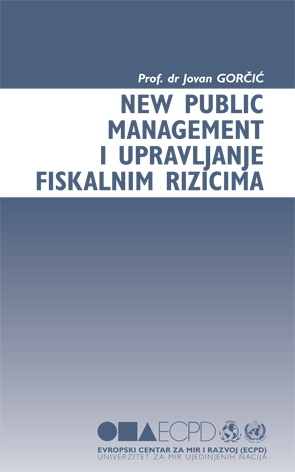
New Public Management i upravljanje fiskalnim rizicima – Knjiga Prva
Prof. dr Jovan GORČIĆ
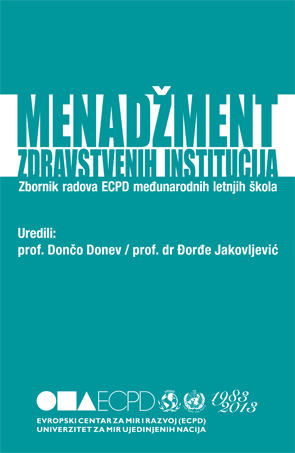
MENADŽMENT ZDRAVSTVENIH INSTITUCIJA
Zbornik radova ECPD međunarodnih letnjih škola
Prof. dr Dončo DONEV / Prof. dr Đorđe JAKOVLJEVIĆ
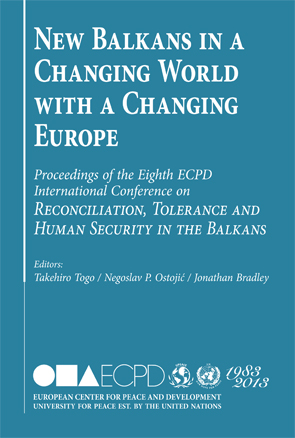
New Balkans in a Changing World with a Changing Europe Reconciliation, Tolerance and Human Security in the Balkans
Proceedings of the eighth ECPD International Conference
Belgrade, October 20, 2012
Takehiro Togo / Negoslav P. Ostojić / Jonathan Bradley
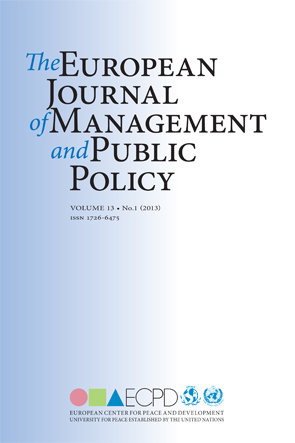
European Journal of Management and Public Policy
VOLUME 13 • No.1 (2013).
ŽELJKO ŠEVIĆ, Ph.D.
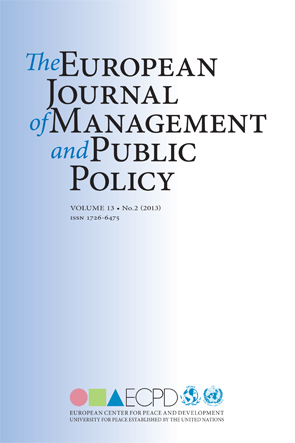
European Journal of Management and Public Policy
VOLUME 13 • No.2 (2013).
ŽELJKO ŠEVIĆ, Ph.D.
2012
****************************
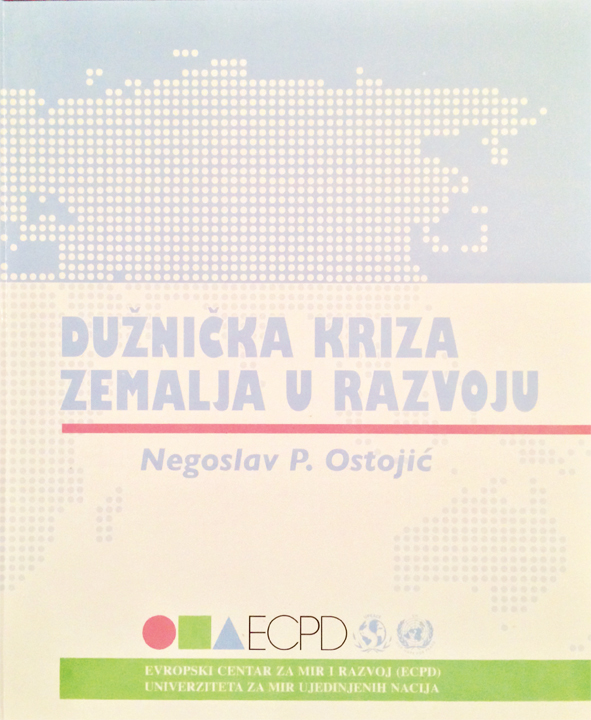
Dužnička kriza zemalja u razvoju
Negoslav P. Ostojić
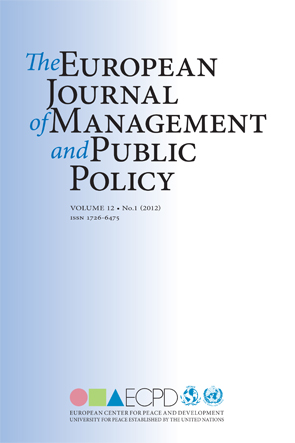
European Journal of Management and Public Policy
VOLUME 12 • No.1 (2012).
ŽELJKO ŠEVIĆ, Ph.D.
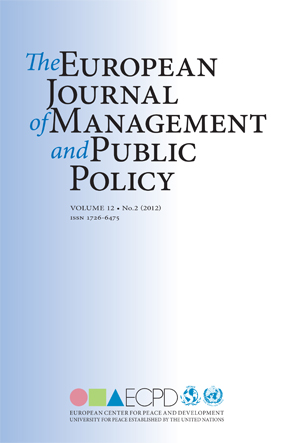
European Journal of Management and Public Policy
VOLUME 12 • No.2 (2012).
ŽELJKO ŠEVIĆ, Ph.D.
2011
****************************
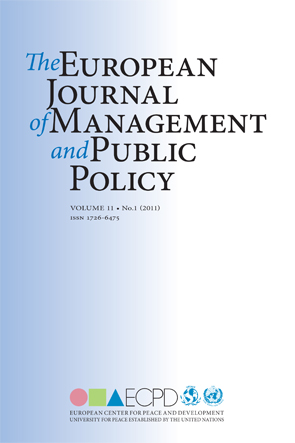
European Journal of Management and Public Policy
VOLUME 11 • No.1 (2011).
ŽELJKO ŠEVIĆ, Ph.D.
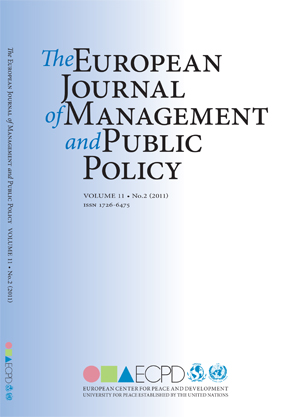
European Journal of Management and Public Policy
VOLUME 11 • No.2 (2011).
ŽELJKO ŠEVIĆ, Ph.D.
2010
****************************
2009
****************************
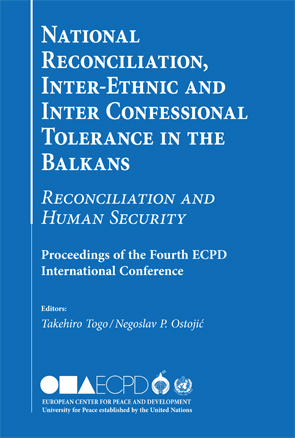
Inter-Ethnic and Inter Confessional Tolerance in The Balkans Reconciliation and Human Security
Proceedings of the Fourth ECPD International Conference
Takehiro Togo / Negoslav P. Ostojić
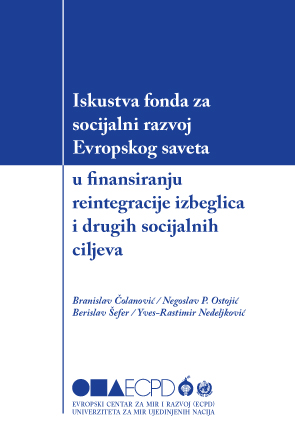
ISKUSTVA FONDA ZA SOCIJALNI RAZVOJ EVROPSKOG SAVETA U FINANSIRANJU REINTEGRACIJE IZBEGLICA I DRUGIH SOCIJALNIH CILJEVA
Branislav Čolanović / Negoslav P. Ostojić Berislav Šefer / Yves-Rastimir Nedeljković
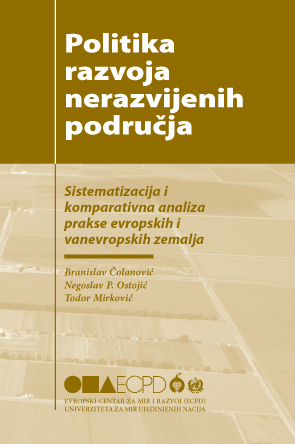
POLITIKA RAZVOJA NERAZVIJENIH PODRUČJA
Sistematizacija i komparativna analiza prakse evropskih i vanevropskih zemalja
Branislav Čolanović / Negoslav P. Ostojić / Todor Mirković
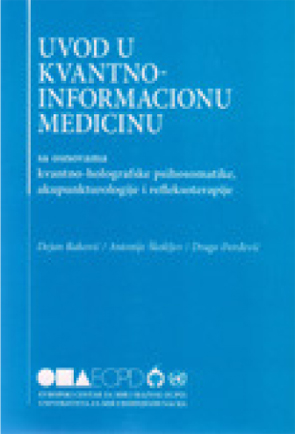
UVOD U KVANTNO-INFORMACIONU MEDICINU
Sa osnovama kvantno-holografske psihosomatike, akupunkturologije i refleksoterapije
Dejan Raković, Antonije Škokljev, Drago Đorđević
2008
****************************
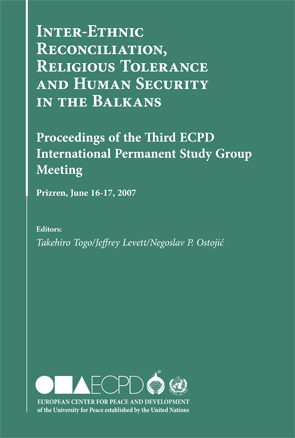
Inter-Ethnic Reconciliation, Religious Tolerance and Human Security in the Balkans
Proceedings of the Third ECPD International Permanent Study Group Meeting
Prizren, June 16-17, 2007
Takehiro Togo / Jeffrey Levett / Negoslav P. Ostojić
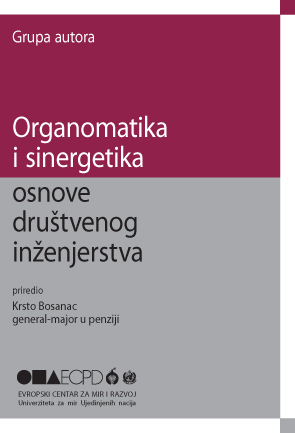
Organomatika i sinergetika
osnove društvenog inženjerstva
Krsto Bosanac
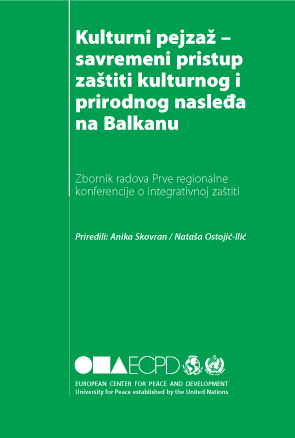
Kulturni pejzaž – savremeni pristup zaštiti kulturnog i prirodnog nasleđa na Balkanu
Zbornik radova Prve regionalne konferencije o integrativnoj zaštiti
Anika Skovran / Nataša Ostojić-Ilić
2007
****************************
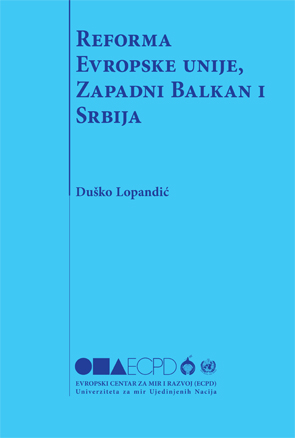
Reforma Evropske unije, Zapadni Balkan i Srbija
Duško Lopandić
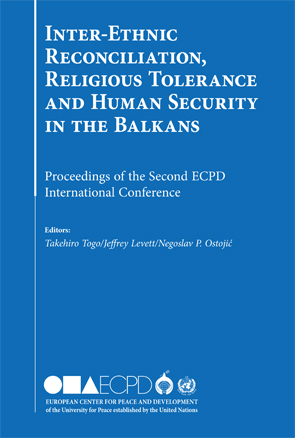
Inter-Ethnic Reconciliation, Religious Tolerance and Human Security in the Balkans
Proceedings of the Second ECPD International Conference
Belgrade, October 27–28, 2006.
Takehiro Togo / Jeffrey Levett / Negoslav P. Ostojić
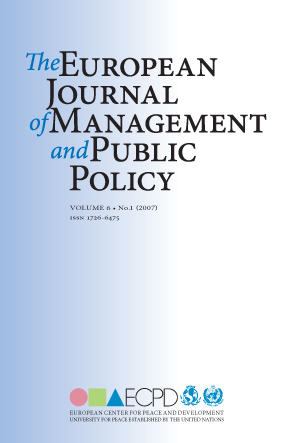
European Journal of Management and Public Policy
VOLUME 6 • No.1 (2007).
ŽELJKO ŠEVIĆ, Ph.D.
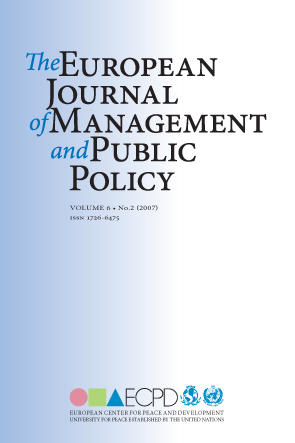
European Journal of Management and Public Policy
VOLUME 6 • No.2 (2007).
ŽELJKO ŠEVIĆ, Ph.D.
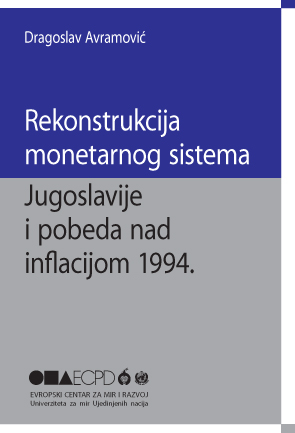
Rekonstrukcija monetarnog sistema Jugoslavije i pobeda nad inflacijom 1994.
Dragoslav Avramović
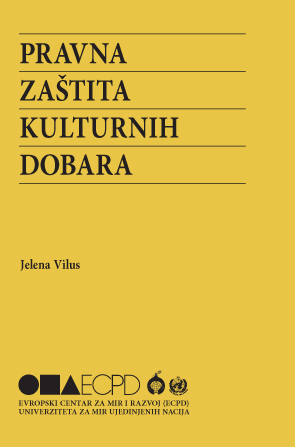
PRAVNA ZAŠTITA KULTURNIH DOBARA
Jelena Vilus
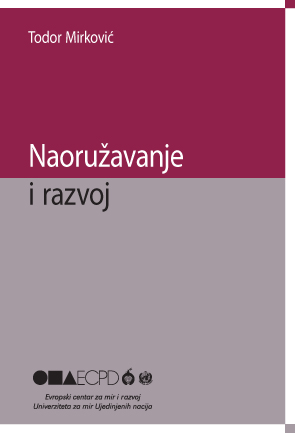
Naoružavanje i razvoj
Todor Mirković
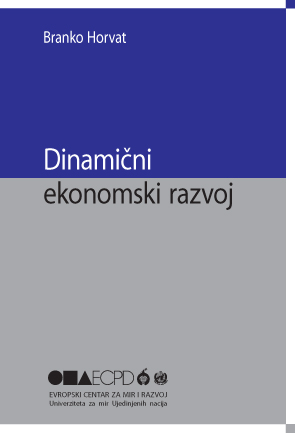
Dinamični ekonomski razvoj
Branko Horvat
2006
****************************
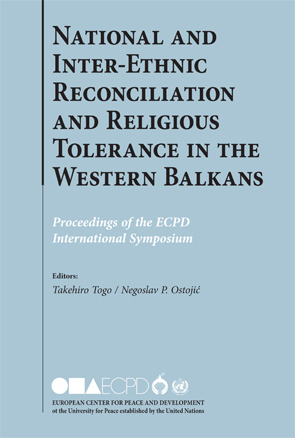
National and Inter-Ethnic Reconciliation and Religious Tolerance in the Western Balkans
Proceedings of the ECPD International Symposium
Belgrade, October 28-29, 2005.
Takehiro Togo / Negoslav P. Ostojić
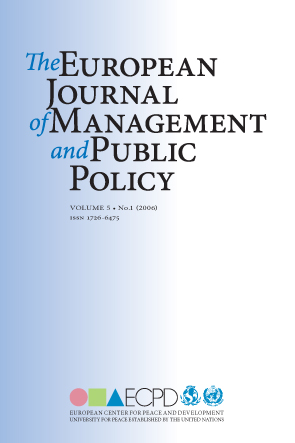
European Journal of Management and Public Policy
VOLUME 5 • No.1 (2006).
ŽELJKO ŠEVIĆ, Ph.D.
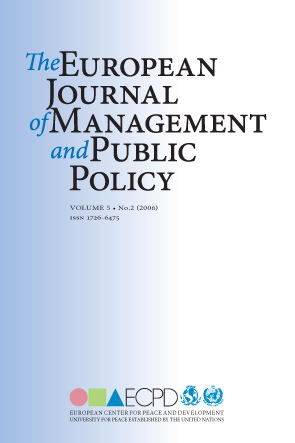
European Journal of Management and Public Policy
VOLUME 5 • No.2 (2006).
ŽELJKO ŠEVIĆ, Ph.D
2005
****************************
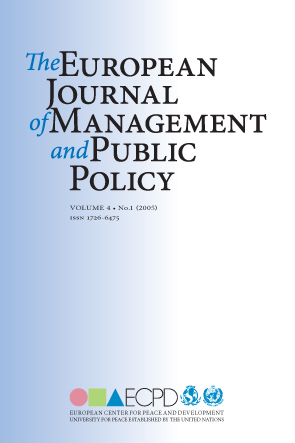
European Journal of Management and Public Policy
VOLUME 4 • No.1 (2005).
ŽELJKO ŠEVIĆ, Ph.D
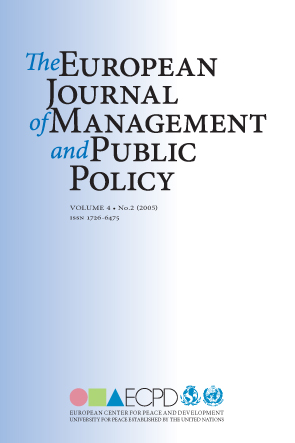
European Journal of Management and Public Policy
VOLUME 4 • No.2 (2005).
ŽELJKO ŠEVIĆ, Ph.D
2004
****************************
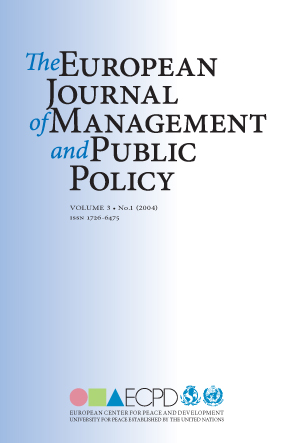
European Journal of Management and Public Policy
VOLUME 3 • No.1 (2004).
ŽELJKO ŠEVIĆ, Ph.D

European Journal of Management and Public Policy
VOLUME 3 • No.2 (2004).
ŽELJKO ŠEVIĆ, Ph.D
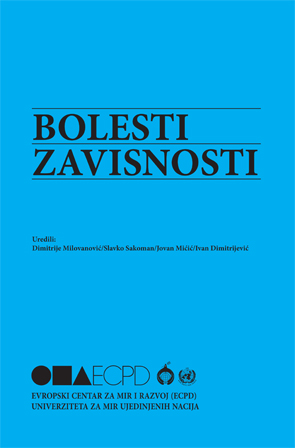
BOLESTI ZAVISNOSTI
Dimitrije Milovanović / Slavko Sakoman / Jovan Mićić / Ivan Dimitrijević
2003
****************************
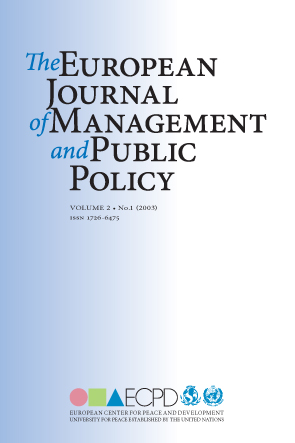
European Journal of Management and Public Policy
VOLUME 2 • No.1 (2003).
ŽELJKO ŠEVIĆ, Ph.D
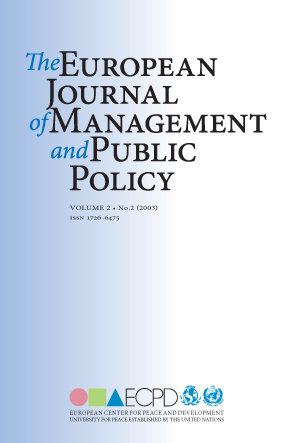
European Journal of Management and Public Policy
VOLUME 2 • No.2 (2003).
ŽELJKO ŠEVIĆ, Ph.D
2002
****************************
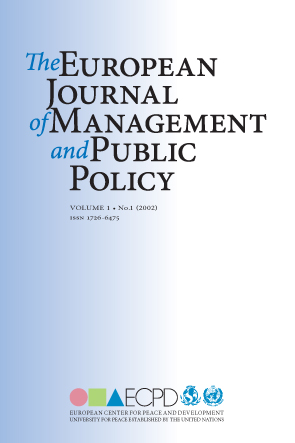
European Journal of Management and Public Policy
VOLUME 1 • No.1 (2002).
ŽELJKO ŠEVIĆ, Ph.D
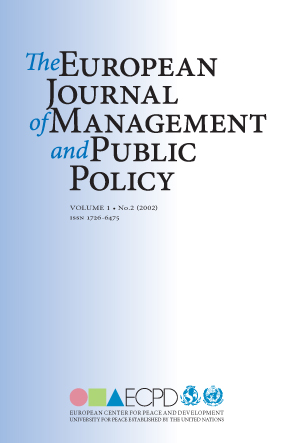
European Journal of Management and Public Policy
VOLUME 1 • No.2 (2002).
ŽELJKO ŠEVIĆ, Ph.D
1997
****************************
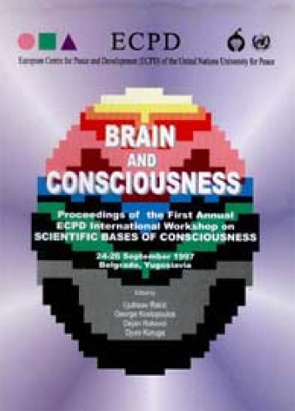
Brain and Consciousness
Proceedings of the First Annual ECPD International Workshop on Scientific Bases of Consciousness
24-26 September 1997, Belgrade, Yugoslavia
Ljubisav Rakić, George Kostopoulos, Dejan Raković, Djuro Koruga
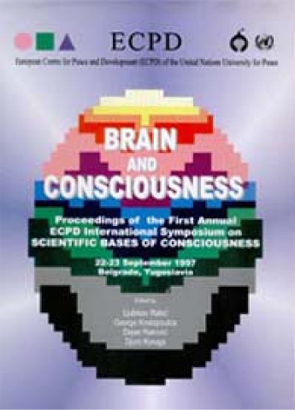
Brain and Consciousness
Proceedings of the First Annual ECPD International Symposium on Scientific Bases of Consciousness
22-23 September 1997, Belgrade, Yugoslavia
Ljubisav Rakić, George Kostopoulos, Dejan Raković, Djuro Korugas
1996
****************************
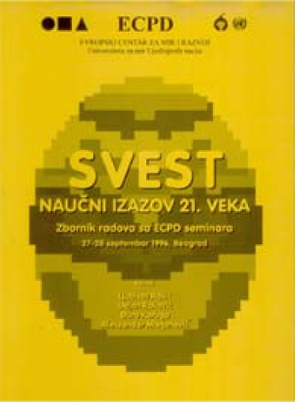
SVEST: NAUČNI IZAZOV 21. VEKA
Zbornik radova sa ECPD seminara
27-28 septembar 1996, Beograd
Ljubisav Rakić, Dejan Raković, Đuro Koruga, Aleksandar Marjanović
1995
****************************

CONSCIOUSNESS: Scientific Challenge of the 21st Century
Dejan Raković, Djuro Koruga
The European Center for Peace and Development (ECPD) could not miss the inclusion in its Working plan and program Publishing as the way of improvement and dissemination of knowledge. This kind of activity includes issuance mainly of two groups of publications:
· Previously published and/or new works which are of particular significance for the ECPD activities in promoting of peace, development and stability, and
· Proceedings of papers presented at the ECPD international scientific and other international meetings, as well as research papers and studies made by the ECPD experts and research teams.Previously published and/or new works which are of particular significance for the ECPD activities in promoting of peace, development and stability, and
Presentation of Shinichi Ichimura’s book
“Political Economy of Japanese and Asian Development”
During 30 years of its existence and work, the ECPD published more then one hundred of its publications in the following areas:
Economy, Finance, Management and Development
International and EU Law
Medicine
International Relations and Cooperation
Consciousness
New Materials, New Technologies and Robotics
Other Publications
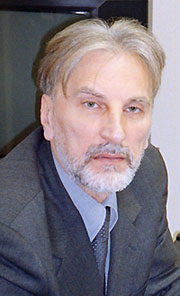 The accomplishments of the European Center for Peace and Development (ECPD) during its 25 years of activity - and its plans for the coming period - reflect its intellectual mission as set out in the founding acts of the ECPD. Its mission has remained unchanged: to contribute to peace and development in Europe as the area of the ECPD’s activities, and to international cooperation in the transfer of knowledge, by organizing international postgraduate studies (at the specialist, master’s and doctoral levels) and postgraduate professional training and specialization (postgraduate schools, specialist seminars, instructive and other courses) and research in the relevant scientific fields. The ECPD’s guiding principle has always been: through peace to development, through development to peace.
The accomplishments of the European Center for Peace and Development (ECPD) during its 25 years of activity - and its plans for the coming period - reflect its intellectual mission as set out in the founding acts of the ECPD. Its mission has remained unchanged: to contribute to peace and development in Europe as the area of the ECPD’s activities, and to international cooperation in the transfer of knowledge, by organizing international postgraduate studies (at the specialist, master’s and doctoral levels) and postgraduate professional training and specialization (postgraduate schools, specialist seminars, instructive and other courses) and research in the relevant scientific fields. The ECPD’s guiding principle has always been: through peace to development, through development to peace.
The ECPD has always operated primarily in Europe, at first in its south-eastern part, with an orientation towards the post-socialist countries that is, countries in transition. Nonetheless, in keeping with its program policy, it has increasingly been open for cooperation with the rest of the world.
The basic premise, upon which the ECPD has based its program orientation and strategy, has been that development under conditions of peace is only possible when conceived as human development.
It is undoubtedly true that a widening gap between developed and developing countries is causing internal and international tension and conflict, thus threatening peace in the world. But it is also true that the development of countries cannot be measured solely by the per capita growth of national income. If we want a stable world peace, we must strive towards human development by means of constant advance in the quality of human life. Education and, more generally, the diffusion of knowledge are the prerequisites for such qualitative improvement. In our view, the recent past, characterized by growing globalization of “good” and “bad” in the world is clear proof that the ECPD has chosen a topical and relevant strategy for its program orientation.
The improvement of the quality of life is achievable by taking a holistic approach to the solution of problems.
The European Center for Peace and Development has chosen an interdisciplinary approach by implementing the following seven, closely inter-connected and inter-linked programs:
· Development of human resources;
· Development of natural resources;
· Economic development;
· Scientific and technological development;
· Sustainable development;
· Cultural development;
· Management.
The work program of the European Center for Peace and Development is based on a synergistic and multidisciplinary approach. Its studies are directed towards finding timely and effective solutions for acute and chronic problems of development and the quality of life in the specific regions of Europe, particularly in its south-eastern region.
The ECPD pays special attention to bringing together the intellectual potentials of the West and the East, as well as to strengthening relations and cooperation between the North and the South. In this connection, the ECPD organizes and conducts the following activities:
· Postgraduate specialist, master’s and doctoral studies;
· Research projects and studies on the current questions of peace and development;
· Scientific meetings, symposia, conferences, courses and seminars at which, among other things, the results of research are presented;
· Publishes, prints and distributes the proceedings of scientific meetings, studies, and other scientific works of relevance to the ECPD’s activities.
The ECPD programs are inspired by the highest standards of international achievements, academic knowledge and experience. Through its programs the ECPD has provided a professional groundwork for the establishment of relations between market economies and economies in transition, for the purpose of narrowing and finally closing the development gap and for promoting better understanding and tolerance between states and peoples in the interests of peace, development and democracy. As an international non-profit organization, the ECPD enjoys full academic freedom necessary for the attainment of its stated aims, especially with regard to the choice of subjects and methods of research for the purpose of peace and the diffusion of knowledge and development.
In the period under review the ECPD Program was based on a synergistic and multidisciplinary approach to post-graduate studies and post-graduate professional training and specialization and research in science. This approach has been used in its expert and pedagogical activity, as a contribution towards building stable peace and human development in Europe, particularly in its south-eastern region.
The ECPD could not have followed this approach, for the realization of its programs had it not succeeded in bringing together the intellectual forces of East and West, of North and South, despite the unfavourable circumstances in which it has often had to operate (the break-up of the ECPD host country, the wars in the region of the former Yugoslavia, the sanctions and blockades imposed by the international community). Yet the ECPD has succeeded despite all these circumstances, thanks to the fact that it has consistently adhered to the principle of full academic freedom and autonomy as an educational and scientific international organization.
Therefore, it makes me proud to state that ECPD achieved remarkable results in the past period: it carried out more than 2500 projects, including the programs of post-graduate education and research projects and studies, international scientific meetings, specialized courses and seminars, publishing of books and other publications. It is quite certain that this could not be done without the support of numerous governmental and non-governmental, national and international organizations, scientists and public figures from a great number of European and other countries, including the United States, Japan, China, India and others.
What the EPCD has so far achieved in these circumstances - including the principle of self-financing - is a guarantee for the future successful work of the ECPD.
The results of the ECPD’s operations, whether judged by the number of projects realized or by their content and international character, could not have been achieved without support and help from numerous international, regional and national governmental and non-governmental organizations and individuals.
In the coming period, relying on its experience and new possibilities, the ECPD will continue to devote special attention to bringing together the intellectual potential of the East and the West, the North and the South, as well as to advancing its cooperation with national and international organizations, academic and other research institutions with a purpose to contributing to the promotion of peace and development in the region of South-Eastern Europe and its neighbourhood.
Prof. Dr Negoslav P. Ostojić










































































 The accomplishments of the European Center for Peace and Development (ECPD) during its 25 years of activity - and its plans for the coming period - reflect its intellectual mission as set out in the founding acts of the ECPD. Its mission has remained unchanged: to contribute to peace and development in Europe as the area of the ECPD’s activities, and to international cooperation in the transfer of knowledge, by organizing international postgraduate studies (at the specialist, master’s and doctoral levels) and postgraduate professional training and specialization (postgraduate schools, specialist seminars, instructive and other courses) and research in the relevant scientific fields. The ECPD’s guiding principle has always been: through peace to development, through development to peace.
The accomplishments of the European Center for Peace and Development (ECPD) during its 25 years of activity - and its plans for the coming period - reflect its intellectual mission as set out in the founding acts of the ECPD. Its mission has remained unchanged: to contribute to peace and development in Europe as the area of the ECPD’s activities, and to international cooperation in the transfer of knowledge, by organizing international postgraduate studies (at the specialist, master’s and doctoral levels) and postgraduate professional training and specialization (postgraduate schools, specialist seminars, instructive and other courses) and research in the relevant scientific fields. The ECPD’s guiding principle has always been: through peace to development, through development to peace.
















